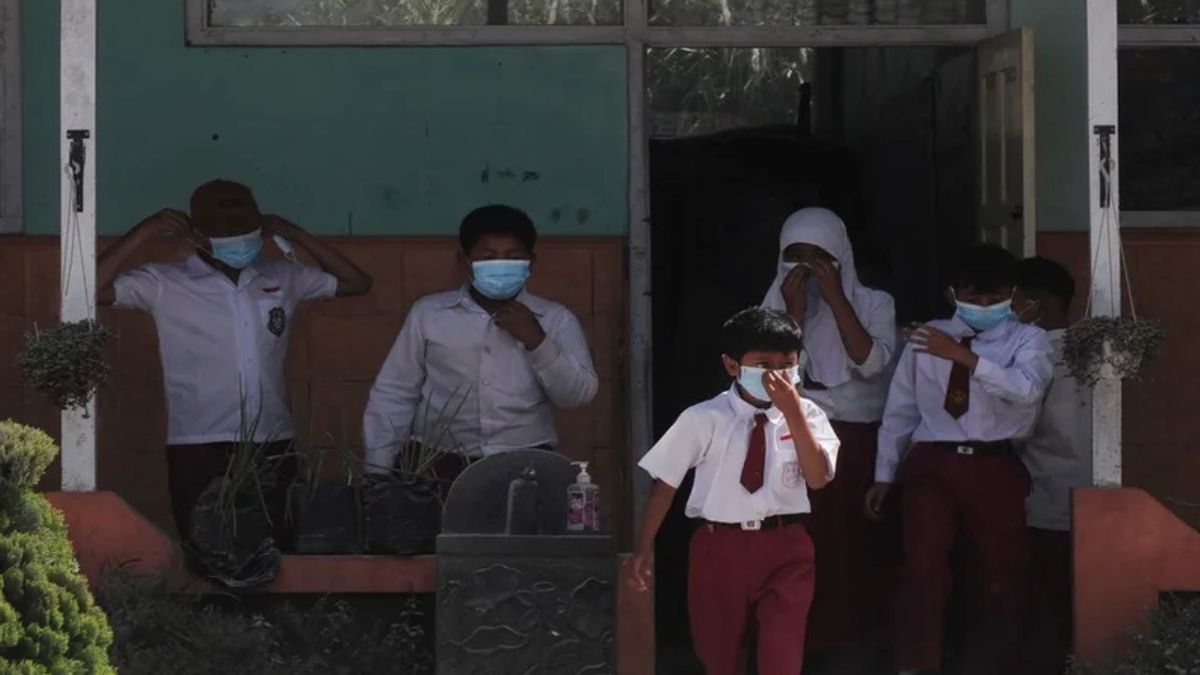JAKARTA The Indonesian Pediatrician Association (IDAI) reminded the importance of vaccination as a solution to prevent extraordinary incidents of infectious diseases in schools and dormitories. In addition to vaccination, the implementation of health protocols can also prevent the spread of infectious diseases in the school environment.
Recently, news about the spread of disease in the school environment has attracted public attention, especially parents. A number of schools even implemented lockdowns and distance learning (PJJ) because the disease spread widely among students.
An example is SMPN 8 South Tangerang (Tangsel) which decided to lock down for 14 days since October 17 to prevent disease spread. This was done after 43 students of SMPN 8 Tangsel were infected with chickenpox and gondongangan.
Subspecial pediatricians of infection and tropical disease Irene Ratridewi explained that Mumps or better known as gondongganan is one of the potential infection diseases that has become an epidemic in schools other than chickenpox (varicella) and hand, foot, and mouth disease (HMFD). This HFMD disease is often also known as the Singapore flu.
The school environment is one of the risky places for children to contract infection. Dr. dr. Irene Ratridewi, SpA(K) said, this was caused by a number of factors ranging from unhealthy snacks and/or contaminated, an unclean environment, to interactions with classmates who were sick.
Given the many cases of transmission of infectious diseases in the school environment, Irene has a number of steps that need to be taken, including pursuing immunizations that are left behind.
"So starting from the central government to the regions, we also take actions that can reduce or reduce the spread of disease. So, just like yesterday facing the COVID-19 pandemic, it must be equally serious," Irene said in an online discussion on infection diseases that often cause outbreaks in schools, Tuesday (12/11/2024).
The problem is, the case of gondongan does not only occur at SMPN 8 Tangsel. In Jakarta, the number of hinting cases reached 1,234 from January to June 2024. This case also occurred in several schools in Bandung and Cimahi, West Java.
Gondongan, caused by the paramyxovirus virus, also spread in East Java with 2,001 cases in Malang Regency, 215 cases in Kediri City, 907 cases in Banyuwangi and 1,596 in Jombang.
According to Irene, gondonggan, chickenpox, and MFMD often stalk school-age children when entering the transition season. These three diseases can spread quickly to children in schools and the environment because of their spread through droplets of airbones or water splashes in the air.
"Children suffering from all three diseases (mumps, HFMD and variricella) must not be allowed to go to school, must remain in quarantine houses, isolation, physical distancing," added Irene.
SEE ALSO:
Doctor Irene also said that the spread of infection occurred massively due to a decrease in vaccinations since the COVID-19 pandemic. The risk is that around 80 million children are in danger of a disease that can actually be prevented by immunization.
Since the pandemic, there have been a lot of disruptions, meaning that it is postponed or maybe even not done at all. There are also 14 percent of them are not vaccinated at all, 27 percent are obedient, keep vaccines," he explained.
"Indeed, the vaccination should be pursued immediately. It would be much better than not being vaccinated at all. For example, if you have been vaccinated but still sick too, as long as the vaccination timing is right, when the antibodies are good or rising, the clinical symptoms will be lighter, even asymptomatic than those who are not vaccinated," Irene added.
Providing complete vaccination does not mean 100 percent can prevent children from getting sick. However, Irene continued, children who get complete vaccinations including chickenpox, gondongan, and Singapore flu will reduce transmission or if infected can minimize severity.
In addition to pursuing vaccination lags behind, Irene also explained other strategies to prevent transmission of diseases that are now widespread in school children.
To prevent the spread of infectious diseases such as gondongan and chickenpox that occur a lot in schools, Irene said, it can be done with simple steps such as maintaining hand hygiene, maintaining physical distance, and self-quarantine if symptoms or symptoms are infected with an infectious disease.
As mentioned earlier, schools are one of the vulnerable places for the transmission of infectious diseases due to several factors, such as the less clean environment, lack of ventilation, and children's interaction.
Generally, school children share eating utensils to toys. Not only that, they also have intense interactions with school friends so they risk transmitting disease.
Therefore, Irene reminded again the importance of implementing health protocols as implemented during the COVID-19 pandemic, including wearing masks, maintaining distance, and washing hands as an effective step to reduce the spread of disease.
"Children are expected to continue to wear masks while in crowded classrooms. Maintaining physical distance also needs to be done, especially when in public places such as canteens or school halls," said Irene.
One other habit that can also be a preventor of disease transmission is the ethics of coughing and sneezing. By teaching children to cover their mouth and nose when coughing or sneezing can prevent the transmission of disease through the air. Therefore, Ireland emphasizes that the ethics of coughing and sneezing needs to be a habit that is instilled from an early age.
The English, Chinese, Japanese, Arabic, and French versions are automatically generated by the AI. So there may still be inaccuracies in translating, please always see Indonesian as our main language. (system supported by DigitalSiber.id)













